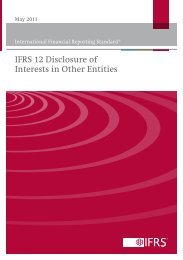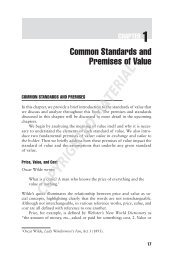ISSUE 5 2008 - Sweet & Maxwell
ISSUE 5 2008 - Sweet & Maxwell
ISSUE 5 2008 - Sweet & Maxwell
You also want an ePaper? Increase the reach of your titles
YUMPU automatically turns print PDFs into web optimized ePapers that Google loves.
Crim. L.R. Rape 395<br />
to stay with K ahead of any consideration. There was also a telling similarity in<br />
the accounts which they had given. In the circumstances of the present case, the<br />
convictions relating to L could not safely be upheld and so too would be quashed.<br />
Per curiam: Rape is a repulsive crime. It requires substantial punishment. No one<br />
doubts that the victims of rape should be treated with every possible consideration<br />
by the criminal justice system. On the other hand, just because rape is a repulsive<br />
crime, a false allegation can have dreadful consequences, obviously and immediately<br />
for an innocent man who has not perpetrated the crime; but also, and this is not<br />
to be overlooked, because every occasion of a proved false allegation has an<br />
insidious effect on public confidence in the truth of genuine complaints, sometimes<br />
allowing doubt to creep in where none should, in truth, exist. There cannot be<br />
very many cases, although the present case may be one of them, where the offence<br />
of attempting to pervert the course of justice, on the basis of a false allegation of<br />
rape, certainly one which is set out in detailed formal statement or pursued to the<br />
door of the court, should not be prosecuted for what it is. It is only in the rarest<br />
of cases that a police caution sufficiently addresses either the criminality of a false<br />
allegation of serious crime or (and this is no less important) the possibility of the<br />
need for appropriate treatment which will address the problems which have led the<br />
complainant to fabricate the allegation she has made.<br />
[Reported by Vanessa Higgins, Barrister]<br />
Jonathan Cooper for the defendant.<br />
Warwick Tatford for the Crown.<br />
Commentary. The case is a stark and troubling reminder of the potentially appalling<br />
impact of false allegations of serious sexual offences. A series of detailed allegations<br />
that convinced police officers were shown by the CCRC to have been fabricated,<br />
leading to C’s convictions being quashed.<br />
There can be no doubting the importance of evidence of prior false allegations,<br />
particularly, as Sir Igor Judge P. observed, where the allegation has been made<br />
formally and in detail or has been pursued to the door of the court. As C. Fishman,<br />
Jones on Evidence: Civil and Criminal, 7th edn (1992), p.803 has noted:<br />
‘‘Afalserapeaccusationrevealsaflawincharacter of a particular, and particularly<br />
dangerous, kind. Its relevance, in a case where the key question is whether the<br />
complainant is lying about rape this time, is palpable.’’<br />
Evidence of prior false allegations is especially important where the case effectively<br />
rests on the credibility of the complainant and defendant. As Epstein argues:<br />
‘‘A witness’s willingness to falsely accuse someone, thereby engaging the legal<br />
system, is confirmatory of a disregard for that system’s requirement of truthful<br />
testimony and a willingness to abuse that same system.’’ J. Epstein, ‘‘True Lies:<br />
The Constitutional and Evidentiary Bases for Admitting Prior False Accusation<br />
Evidence in Sexual Assault Prosecutions’’ (2006) 24 Quinnipiac Law Review 609<br />
at 656.<br />
The principles underlying the admissibility of evidence of prior false allegations under<br />
the Youth Justice and Criminal Evidence Act 1999 are clear, having been laid down<br />
in TandH[2001] EWCA Crim 1877; [2002] 1 W.L.R. 632. The defendant sought<br />
leave to cross-examine the victim in order to establish that the victim had made<br />
© SWEET &MAXWELL






